Fuel poverty: An anatomy of a cold home
- Published
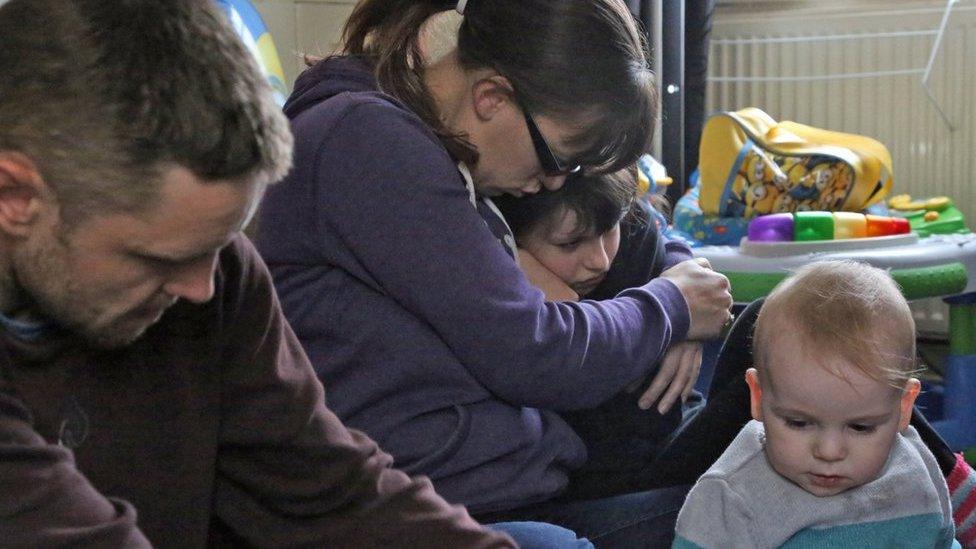
In the year 2000, Parliament agreed to end fuel poverty by 2016. But 16 years on, more than a million working families still cannot afford to heat their homes. One family - Hayley, her partner Dan, and two children - are struggling.
Hayley and Dan's Bedroom
It's 03:00. Hayley and Dan need to be up in a few hours for work but neither of them is asleep. They've both been woken up by the cold. It's a familiar battle.
They live in a draughty two-storey, semi-detached house in Hastings that's hard to keep warm. It means that with even a slight dip in the temperature outside, their bedroom soon feels like an icebox. Hayley estimates they spend £15 to £20 on electricity and £15 on gas per week.
They can't afford to keep the heating on during the night and so almost every night in winter is a fractured sleep. "It does feel like we're outside, especially with no insulation in the walls and the wind coming through the windows," says Dan.
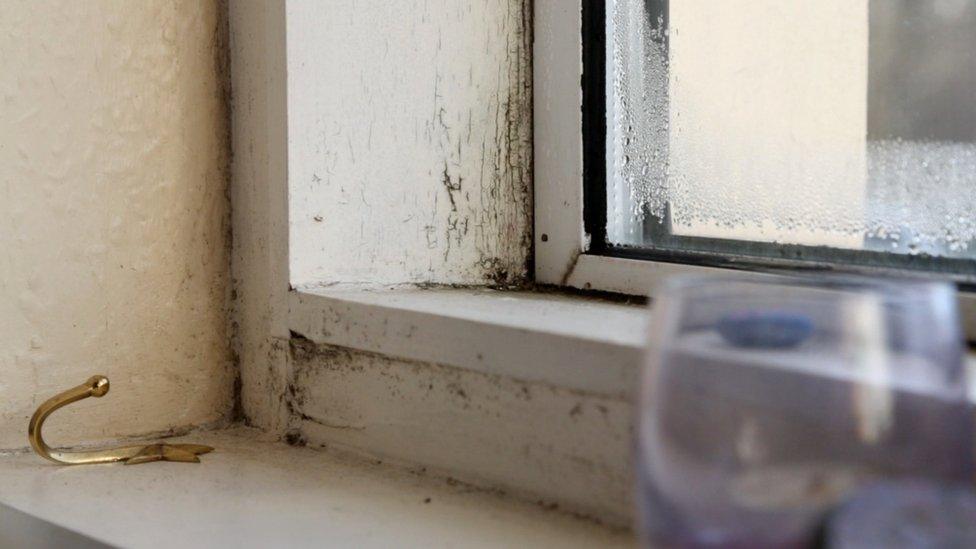
Hayley's also worried about the effect the cold nights are having on her 12-month-old son. "It's absolutely freezing. It's horrible being woken up with the cold because obviously if you're woken up as an adult then you worry about what your kids are going through."
Although he's bundled up in pyjamas and blankets, she brings the baby into bed with her and Dan in the early mornings when it's coldest, to keep him warm. Before he turned one, he was rushed to hospital with croup - a respiratory infection - and has had several doses of antibiotics
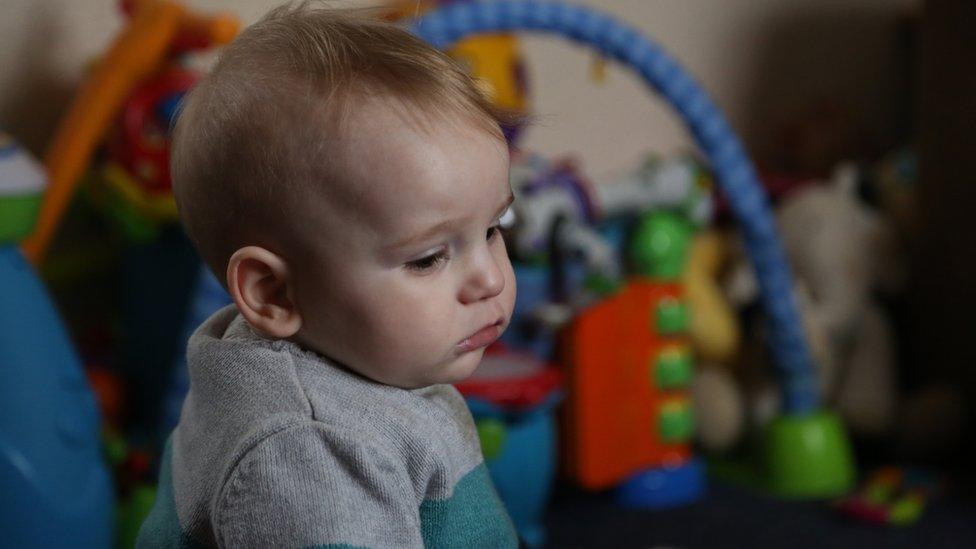
By 05:00, they give up on sleep and Dan gets up to put the heating on. Their entire home is poorly insulated and so it takes a few hours for it to warm up. Until then the warmest place for everyone is Hayley and Dan's bed.
Ava, Hayley's nine-year-old daughter, often joins them too. Toys are put out on the bed for the baby and everyone huddles together. It means the whole family is confined to the small double bed until they can start moving.
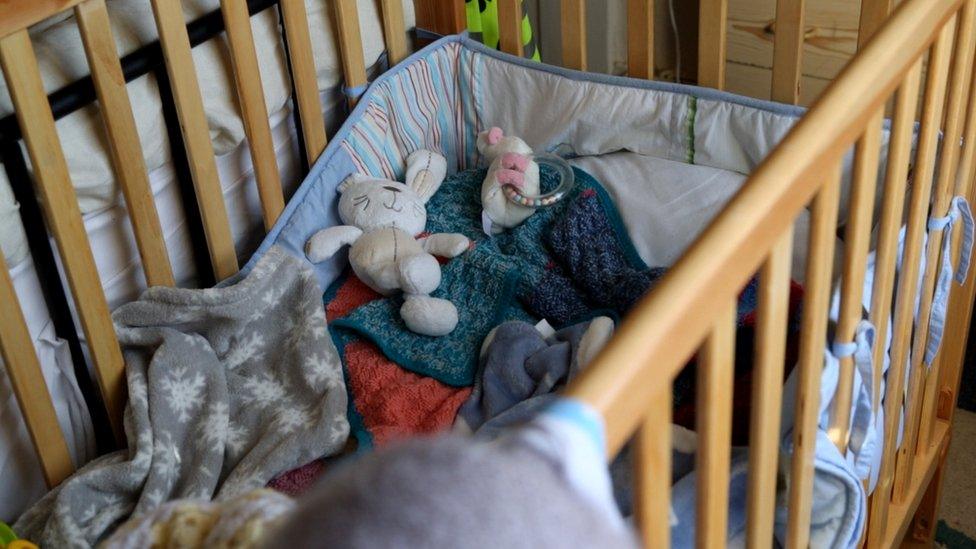
"It's lovely to have family time and have everybody in the bed but it's also quite annoying because family time isn't meant to be spent on the bed for a good hour to get into the flow of life," says Hayley. "You're meant to get up and go downstairs and have breakfast and stuff and we just couldn't do it this morning. It was too cold. Way too cold."
Now it's off to work and school. Hayley and Dan are not alone. Officially there are more than one million working families in fuel poverty - it means they can't afford to heat their home.
Ava's Bedroom
Ava's room is painted bright pink and covered in teddies. On the surface, it doesn't look any different to the thousands of little girls' bedrooms across the country.
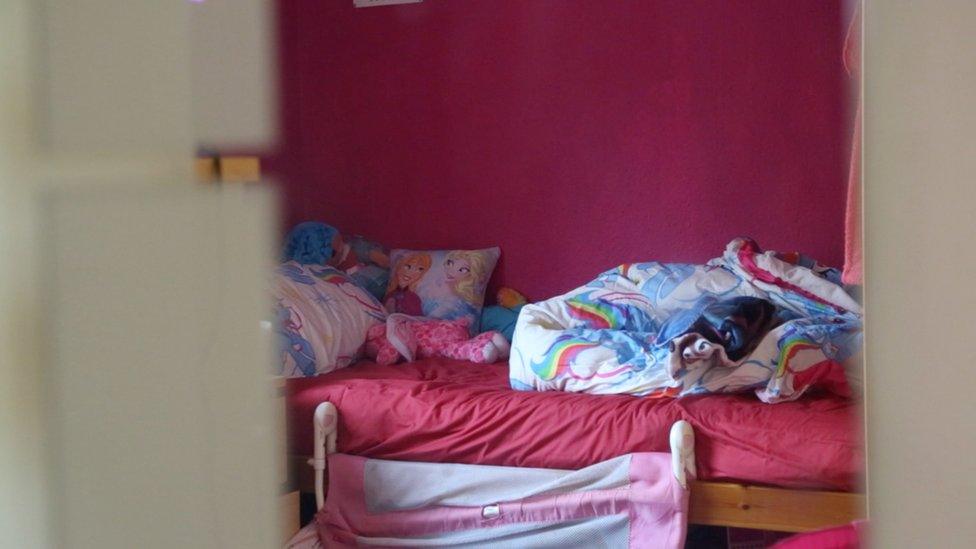
However, cold houses are often damp houses. Every room in the family's home has damp but Ava's room is the worst. Mould grows along her window. The little trinkets she lines her window sill with have to be frequently scrubbed to get rid of the black spots.
Hayley says she's constantly disinfecting areas of Ava's room with bleach and has to throw out some of Ava's favourite toys because they've become too mouldy.
"From literally the minute we come into the winter I have to be on it. I have to go round, check all the windows, wipe them all down, go round all the window sills, then go round all the walls and scrub them down. I've done that every year including when I was pregnant."
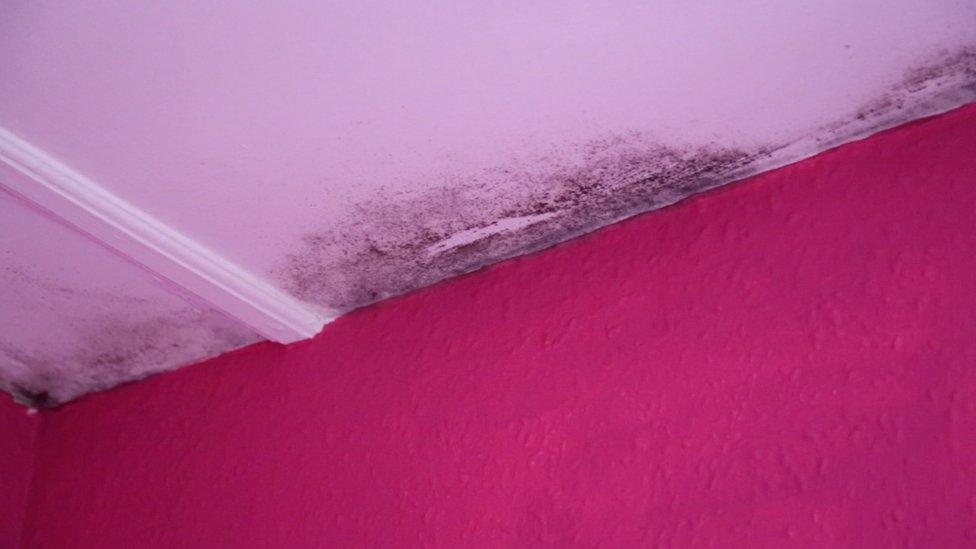
Even still, the mould upsets Ava. The only place where they can fit her bed is under a large patch of mould on the ceiling. She says it upsets her every night before she goes to sleep.
"I keep thinking that every time when I go to bed the roof is going to fall down. And then I wish it wasn't there because then I wouldn't be thinking that. I really want it to go away."

Find out more
The Panorama programme, Too Poor to Stay Warm is broadcast on BBC One on Monday 21 March at 20:30 GMT. Catch up on BBC iPlayer.

The cold and damp mean Ava's bedding is often wet to the touch. She has two duvets on her bed so that her mum can swap them round when the one next to her skin gets damp. Going to sleep means putting on lots of layers so the cold doesn't wake her in the night - onesies, pyjamas, jumpers.
But it doesn't always work. "When it's cold, it feels like the whole house has turned into a big block of ice. It feels like someone is rubbing ice on my nose," she says.
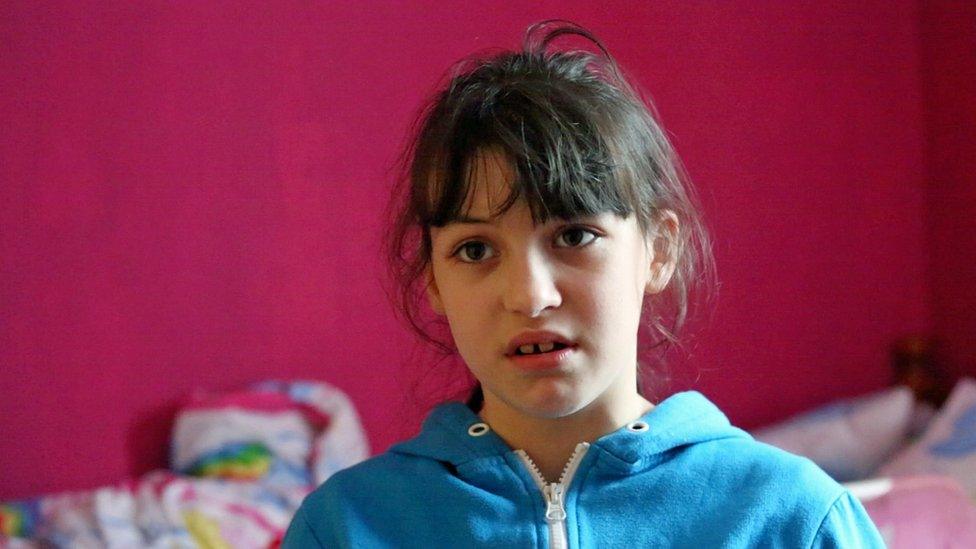
Being cold at home and the broken sleep is starting to affect Ava's work at school. "It makes me really tired at school if I don't sleep well and then I can't concentrate," she says.
"In winter, I get really poorly and I'm up all night coughing. I'd like to move to a house that doesn't have any mould in the bedrooms or anywhere. That would be better really."
Bathroom
Every morning there's the daily battle to use the bathroom before work and school. The elderly boiler also lives here.
Hayley jokes that it's older than her but switching it on every day is a constant worry. "It sounds like it's going to take off. It's racketeering around and you have to smack it to make it work."
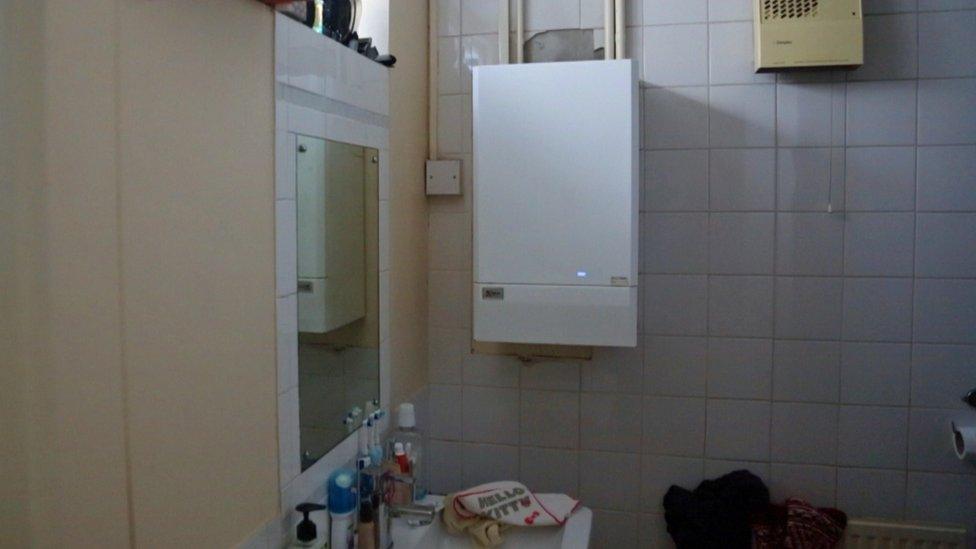
The boiler no longer works efficiently, even when it does come on. It can't heat the water and heat the house at the same time so every morning Hayley and Dan have to make the decision whether they and the kids have a hot shower or turn on the central heating. They're worried that it will pack up at any moment.
Living Room
The living room gets used the most. It's cheaper and easier to try and keep just one room warm and ultimately this means that in the evenings everyone piles into the living room.
It's not a large space but it has to accommodate everyone's needs. For the baby this means learning to walk while Ava also has to do her homework there because her room is just too cold to work in.
She says it's difficult to concentrate when the baby is crying which she says is all the time. Cramming everyone into one room at the end of the day just so they can keep warm makes it harder to unwind and sometimes tensions run high.
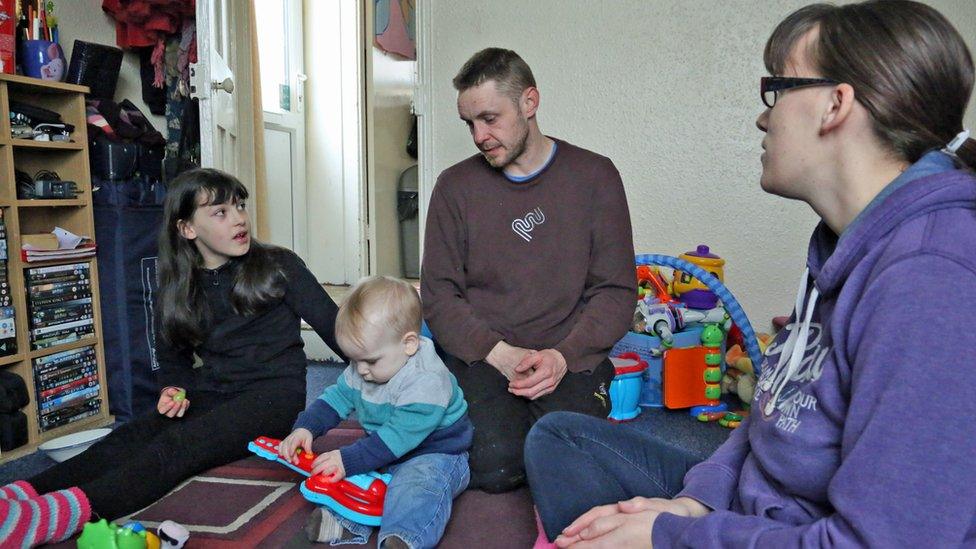
They've had to learn through trial and error where to put their furniture to avoid the worst of the damp and mould. Hayley says that the first winter the sitting room was originally the other way round.
"I had the sofa up against the wall over there and everything that was up against the wall… a buggy, laptop bag and a few other items, all had to be thrown in the bin due to white mould just being all over it. The back of the sofa, thankfully, was leather so I could wipe it off."
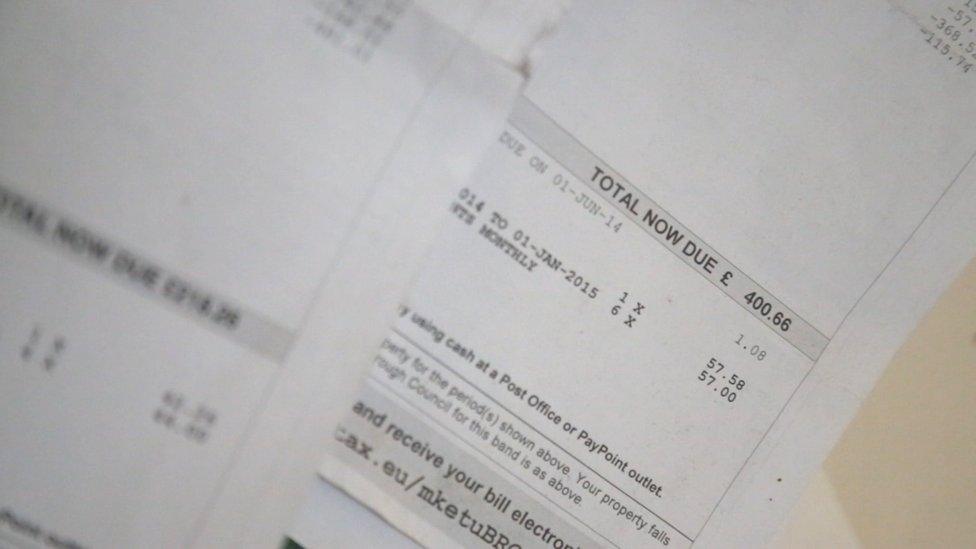
Cold houses aren't just uncomfortable to live in. Low temperatures in your home make you more prone to illnesses. It's a constant physical stress on everyone but there's also a hidden emotional drain.
"The kids getting ill is one of my biggest worries. The situation has had me in tears several times," says Hayley.
The emotional stress is also affecting Ava. "I worry that I'm going to wake up one day and my mum's not going to be here because she's really ill and she's going to be in hospital. That's why every time I go to bed I want her to go to bed after me so I know that she's in bed."
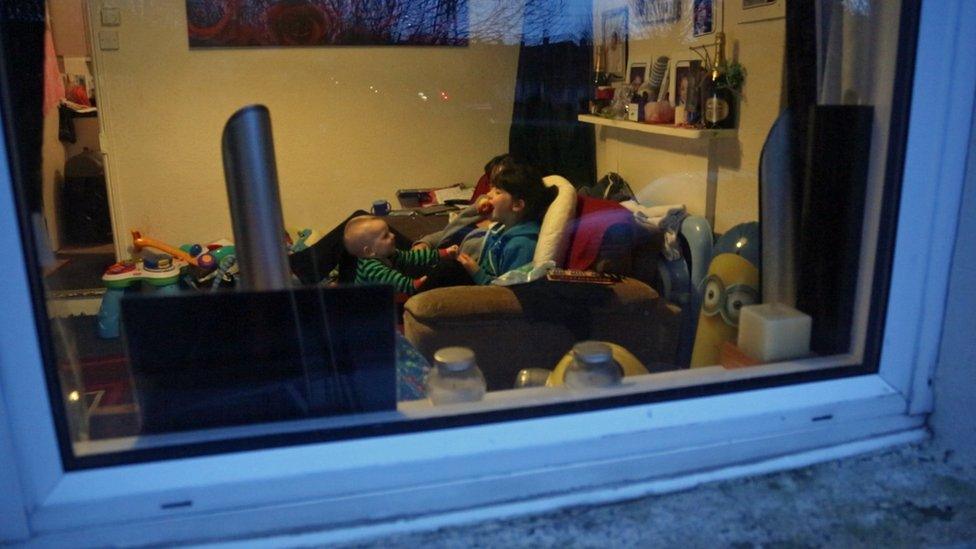
For people living in a cold home like this the impact can stay with you for years.
"When you're a kid you sit there and you think, 'When I grow up I'm going to have this big house and it's going to be great,'" says Hayley. "Your home's your safe place, your warm place, your comfort. But I just don't want to be in this house. I just exist here, that's it really, no more than that."
Panorama - Too Poor to Stay Warm is broadcast on BBC One on Monday 21 March at 20:30 GMT. Catch up on BBC iPlayer
Subscribe to the BBC News Magazine's email newsletter to get articles sent to your inbox.